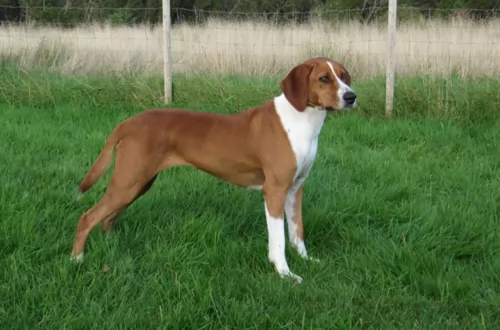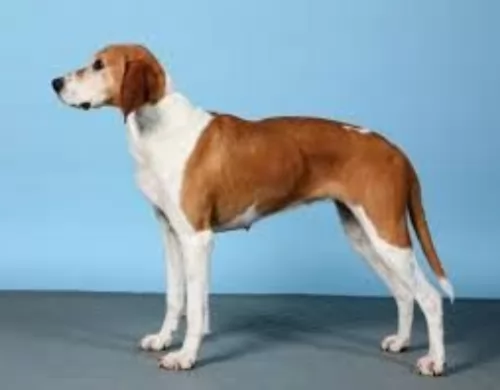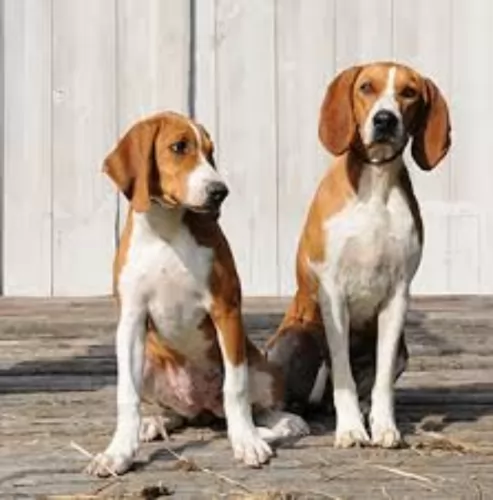 Petzlover
PetzloverHygenhund is originated from Norway but Turnspit Dog is originated from United Kingdom. Hygenhund may grow 31 cm / 13 inches higher than Turnspit Dog. Hygenhund may weigh 11 kg / 25 pounds more than Turnspit Dog. Both Hygenhund and Turnspit Dog has same life span. Hygenhund may have more litter size than Turnspit Dog. Hygenhund requires Moderate Maintenance. But Turnspit Dog requires Low Maintenance
 The Hygenhund is a hound from Norway that was developed in the early 1800’s by the Norwegian breeder Hygen. It was developed for hunting small game such as fox, rabbit, hare or racoon. It is known for its endurance and ability to survive travel across vast artic land without fatigue. It was developed by crossing several Norwegian hounds with ones from England and Germany. This includes basset hounds, holsteiner hounds, beagles, Bloodhounds, Scandinavian hounds and English Pointers. The resulting Hygehound is a scent hound whose popularity fell in the 20th century. Most of the remaining dogs today are located in Norway. The Norwegian Kennel Club and the UKC have both recognized the breed yet its numbers remain low. Even at that the breed today remains a great hunting dog but it is also a great companion or family dog.
The Hygenhund is a hound from Norway that was developed in the early 1800’s by the Norwegian breeder Hygen. It was developed for hunting small game such as fox, rabbit, hare or racoon. It is known for its endurance and ability to survive travel across vast artic land without fatigue. It was developed by crossing several Norwegian hounds with ones from England and Germany. This includes basset hounds, holsteiner hounds, beagles, Bloodhounds, Scandinavian hounds and English Pointers. The resulting Hygehound is a scent hound whose popularity fell in the 20th century. Most of the remaining dogs today are located in Norway. The Norwegian Kennel Club and the UKC have both recognized the breed yet its numbers remain low. Even at that the breed today remains a great hunting dog but it is also a great companion or family dog.
It is amazing that this small dog’s popularity comes from him being used in the kitchens to roast meat. The British enjoyed eating their meat which they roasted on a fire.
These dogs were essentially regarded as a tool – a means to an end, and when kitchens were modernized, they were no longer needed, and they became extinct.
Referred to as the kitchen dog or cooking dog, the first mention of these little dogs was made in 1576. By 1850 the dogs had become scarce and by 1900 it seemed as though there were none left.
 The Hygenhund has a solid rectangular and compact body with muscular and compact legs and paws. Their heads are shaped like a triangle with dark eyes and a broad skull. The muzzle and neck are long and the topline is even. They carry their tail high, but they do not curl it over their back. They are a medium sized dog with short hair. They have an overabundance of energy and get bored easily. They can come in black with chestnut or white markings, yellow and red, chestnut without or with black markings.
The Hygenhund has a solid rectangular and compact body with muscular and compact legs and paws. Their heads are shaped like a triangle with dark eyes and a broad skull. The muzzle and neck are long and the topline is even. They carry their tail high, but they do not curl it over their back. They are a medium sized dog with short hair. They have an overabundance of energy and get bored easily. They can come in black with chestnut or white markings, yellow and red, chestnut without or with black markings.
The Turnspit was a small long-bodied dog, standing at between 20 to 30cm in height and probably weighed anything between 9 and 14kg in height.
The legs were somewhat crooked or bandy and Edward Jesse, who wrote ‘Anecdote of Dogs’ in 1846 described them as ugly dogs with a miserable look to them. That was probably due to him having to fit into the hamster-like wheel contraption that turned the meat being roasted in the kitchens.
They were low-bodied dogs, similar to a Dachshund or a Corgi with short, stocky legs, short floppy ears, and a short coat. The long tail curled over its back. It is believed that the coats were white, reddish-brown, gray or black.
The dog was certainly feisty, energetic and hard-working with not much being written about his temperament. He was a working dog, but given the chance, he would no doubt have been loving and loyal, longing for the chance just to be part of a human family and to be loved.
 1. Children friendliness – The Hygenhund is very friendly to children and love to play with them.
1. Children friendliness – The Hygenhund is very friendly to children and love to play with them.
Stamina, intelligence and ability to endure cold climates.
Very adaptable in some ways – enduring cold climates for instance. However, they need a large yard or area to run in. They are not as adaptable in an apartment.
The Hygenhund is very intelligent and a quick learner. They love learning new things.
The Turnspit dog had a tough life, but would no doubt have made a wonderful little pet had he just been allowed to be a companion dog.
Make sure that when you buy a dog, you don't just put him in your backyard and forget about him. Give him the love and care he deserves.
The health and lifespan of a dog is influenced by quite a few things such as food, care, love, exercise and the type of breed it is. Generally smaller dogs live longer than big dogs, and mixed breed dogs live longer than pure breeds.
The Turnspit dog, if he had received the proper care, could have lived to between 10 and 15 years of age.
Stress can bring on a sudden drop in blood sugar. The Turnspit had reason to be stressed, working hard in horrible conditions. Dogs become weak and lethargic and can scarcely maintain an even gait. A sudden drop in blood sugar can cause a small dog to go into a fatal coma.
This ailment seems to occur more often with smaller dogs. The pancreas becomes inflamed and your dog has vomiting, diarrhea, abdominal pain and dehydration. Pancreatitis can come about because of trauma, metabolic disorders or infection.
 Since the Hygenhund is such a high energy working dog feed a high quality food. Feed 3-4 times a day for a total of 2.3 cups.
Since the Hygenhund is such a high energy working dog feed a high quality food. Feed 3-4 times a day for a total of 2.3 cups.
Again this is a high energy dog. Feed a high protein good quality dog food twice a day for a total of 3-4 cups.
Good speed and stamina. Good in cold climates.
The Hygenhund needs plenty of exercise to dissipate all its working energy. They will excel at field trials, lure coursing, fly ball, tracking, and agility.
A dog is man's best friend, but the Turnspit was essentially just a working dog and most likely didn’t receive the proper care he deserved.
Small dogs like these would have had basic needs. Their owners would have had to pay attention to the dog's health, because he needed to work.
We look at ways in which a small dog like the Turnspit should have been cared for -
One wonders if the Turnspit was allowed to eat any of the roast meat he worked so hard on to get ready. Every dog should have a regular meal.
Most adult dogs should be fed 2 meals of kibble a day. If the Turnspit wasn’t extinct he would have required a high quality ‘small dog breed’ commercial dog food. Home-made food would also be a requirement – some boiled chicken, brown rice and vegetables. Dogs want and appreciate simple, wholesome foods that won’t upset their digestive systems.
Along with good food, dogs need cool, fresh water constantly available to stay healthy.
Make sure he gets to the veterinarian if he is sick, but also for his vaccines to prevent him from getting some of the worst dog diseases there are.
Groom your small dog regularly. The Turnspit had a shortish coat and would have required a brush twice a week. Other grooming procedures for a small dog like the Turnspit would have been keeping his nails trimmed and checking the inside of his ears and his mouth for ear infections and dental disease.